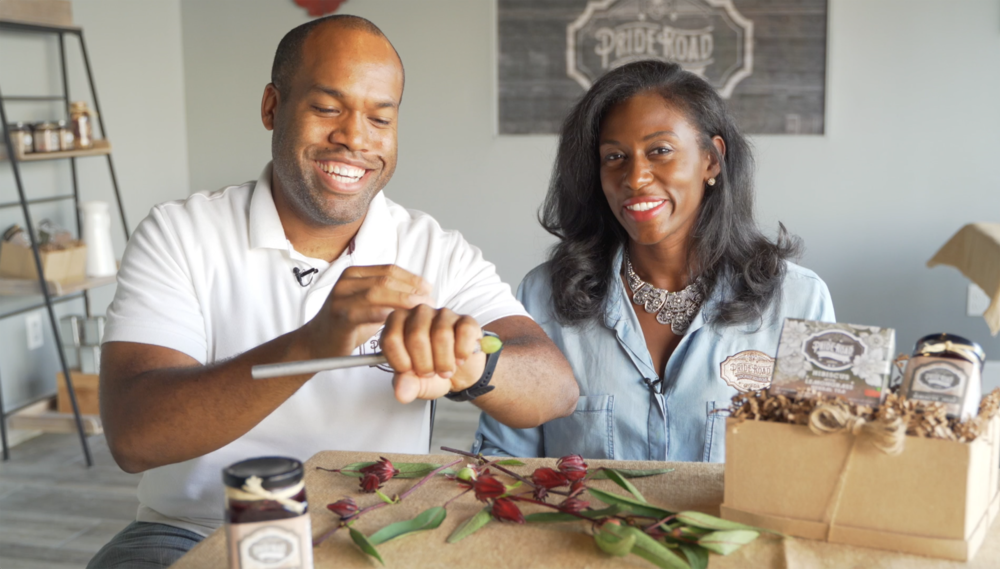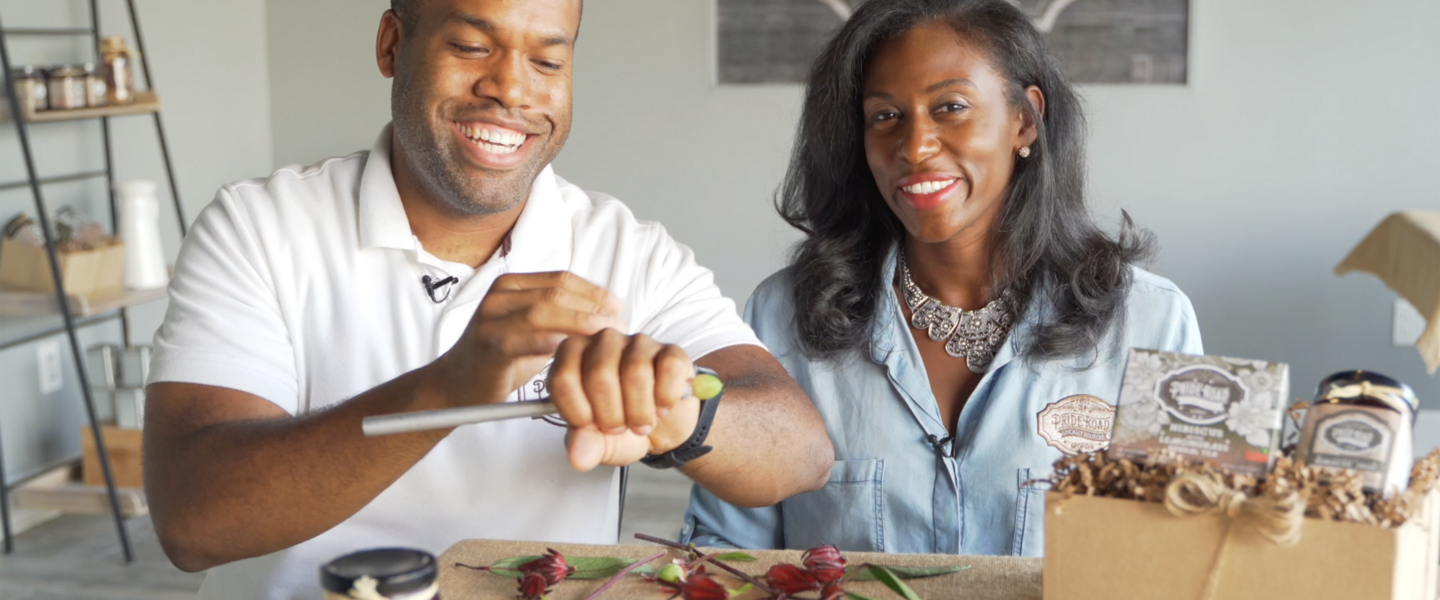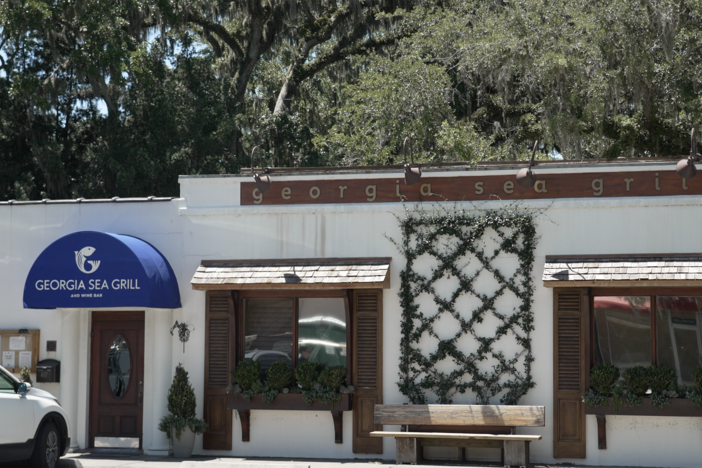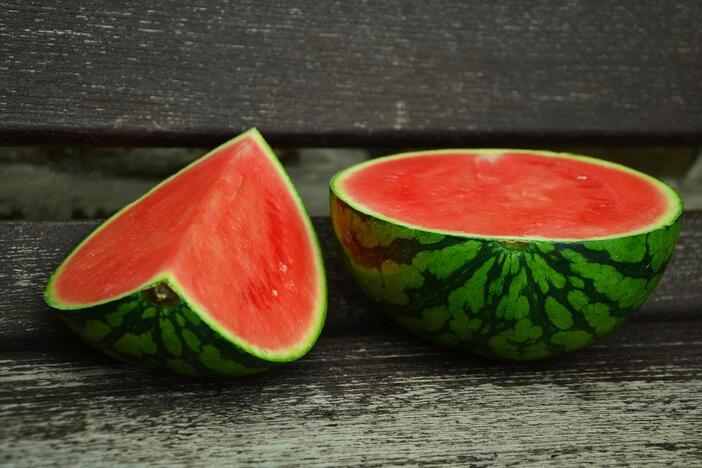
Section Branding
Header Content
A Fork in the Road Podcast: Pride Road Hibiscus Based Products
Primary Content
Hibiscus is a tropical plant, but it is being grown in Metro Atlanta and is used to make a variety of products. Today David will learn about Pride Road's line of hibiscus-based products: jelly, chutney, tea, and soda.

(TRANSCRIPT)
Najeeb Muhaimin: We boil this thing down in order to give you an actual...the fruit. So, when we say that hibiscuis is in our product. This is what you're getting. The real thing.
David Zelski: Hibiscus is prominent in songs, poetry and literature. The world over. It's used in Hindu worship. In the Philippines, it's actually used by children as part of a bubble making pastime. The hibiscus flower is traditionally worn by Tahitian and Hawaiian girls. And if the flower is worn behind the left ear, the woman is married or has a boyfriend. If the flower is worn on the right, she's single or openly available for relationship. The hibiscus is a national symbol of Haiti, the national flower of the Solomon Islands, South Korea, and Malaysia. And the state flower of Hawaii. So what's with all the hibiscus facts all of a sudden? Well, it's being grown in Lithonia, Georgia, and is used to make tea, chutney, jelly, and more.
Theme Song: I came from the mud, there's dirt on my hands. Strong like a tree, there's roots where I stand.
David Zelski: I'm David Zaleski, and this is the Fork in the Road podcast, featuring the stories from Georgia's farmers, fishermen, merchants, artisans, chefs and others who help provide Georgia grown products to folks in the Peach State and beyond. Today we're talking hibiscus with Najeeb, Millie, and Yasin at Pride Road in Lithonia, Georgia. We are 19 miles east of downtown Atlanta. Not really the place you'd expect to find a tropical plant farm. Yet, here we are.
Najeeb Muhaimin: It has been known to have...they call it the flora cranberry. So it has a tart taste to it. But believe it or not, we marry up the hibiscus with the leaves and it almost like that settles that the taste of the tartness of just a tad bit. When you talk about the what we use the tea. The soda, we use straight calyx. So of course we have that other ingredient just to flatten out that tartness and we just as sugar as far as the flattening out, the taste of the soda, but is it's a cranberry tastes like a tart, tart type taste.
David Zelski: Teas and soda that taste like cranberry. I think we're getting way too far ahead of ourselves. So let's back up and talk to Yasin, the elder in this family run business. All right. We are here. Tell me where the farm is. And it's growing all around you.
Yasin Muhaimin: You're actually in Lithonia, Georgia. You you're on on a 22 acre plot owned by Mr. Stewart Minor. He lives right here in Snellville. And we were right off of the Yellow River and the line between Gwinnett County and DeKalb County is right over here to our left. This this was a family farm. And when we started this project this year, they hadn't farmed in this area for, what, 20 to 25 years and in our past 25 years. So we had no there were no problems with fertility and soil quality and that kind of thing. And we were able to to pop our transplants in and and get going.
David Zelski: Pop our transplants in? He made that sound easy. He must have some history in working on a farm.
Yasin Muhaimin: Yeah, we're. We're from Louisiana. We're from. Actually, I'm my wife and I. And Najeeb, before coming here, we were Katrina evacuees, and I wasn't a farmer. I was a network administrator for the New Orleans Public School District. I taught mathematics, and my area is math as income and teaching majored in computer science. So I taught computer science, and that ended up being the network administrator after the Y2K problem, but was forced into retirement when Katrina closed all of the schools down and moved moved into Zachary, Louisiana, where where I was born on. We were able to buy a five acre farm and started all over. Had some friends there. I was with been dealing with a few other folks at Southern University, and even some people at LSU that helped us with getting started. Our our main product was pasture raised chickens, and we sold at the farmers market. We sold from the farm and we sold to several stores in the area for years, for years until the next hurricane came Hurricane Gustav. And we had to do get out. But we did that for about 12 years or so.
David Zelski: Not to dismiss it, but that kind of sounds like regular farming. So where did the idea for growing hibiscus come from?
Yasin Muhaimin: Well, we were introduced to it at Southern University at the AG Center, and we used to attend these conferences and a lot of folk from Georgia attend them, also. Southern SAWG. The Southwest Agriculture Working Group, and they bring farmers together for conferences and to share information and introduce programs that would help. And Southern was was the leader at that time and pushing this particular herb, hibiscus, and we were able to get some seeds from them. We did a lot of work with this in a community where I lived on Port Hudson-Pride Road in Zachary, we had about 12 farmers that work with us. With my wife and I are growing this hibiscus that's that's basically how we how we got started with that.
David Zelski: We'll go inside to talk to Yasin's son and daughter in law Najeeb and Millie, to find out why they're now growing hibiscus in Georgia.
Najeeb Muhaimin: One, we've made our home. I know it grows well. So Hibiscus is definitely your subtropical plant. And I know my wife mentioned earlier as far as is is, was it totally drought resistant? But it can actually it's a hardy plant. It doesn't take much as far as water. Once it gets up and going, going, you know, you can leave it alone and it will continue to grow. So I've made a mistake by dropping a couple of seeds just out of my pocket and I come back and it's just growing in front the house. So you got to be careful when you drop these seeds. But as far as Georgia one, I mean, what we met in Georgia, so we can have. Yeah. Any other other place? I came here by way of Louisiana, the Hurricane Katrina. We've made our home. But it was for me. I think Millie could talk more of it as well. And of course, my dad, he he started, I want to say, three generations back, if not before. Great grandfather, my grandfather, my dad. They came from a family of farmers after Hurricane Katrina. They went into free range chicken farming and was introduced to the hibiscus to diversify their their what they sold at the farmers markets.
Millie Muhaimin: I just think we have been able to put our own little spin on it a little bit where we've taken just a little bit of both, you know, not too overpowering with any spices and then, you know, not too bold, not too tart. And I think we've come up with something that works for us. So and then when you think about it, we are unique in that we grow, we harvest, we produce our own products, we own our entire process. We don't outsource any of our process to anyone so that we can control what we are providing to our customers.
David Zelski: That's actually really nice. Two cultures being merged by the tragedy of a devastating hurricane and the beauty of love and marriage to create unique products all their own.
Najeeb Muhaimin: You know, we will go down and visit and enjoy the taste of what they had as far as product wise. And when I married into the family, it was one of those, you know, Caribbean style hibiscus, sorrel, I'm sorry, I'll definitely say as far as the taste of of the beverage that they had. So it just went hand in hand as far as just marrying up what was being done down in Louisiana, what was what I was introduced out here as far as, you know, Carribean style.
Millie Muhaimin: Yeah, it was definitely kind of a oh, you know, my father in law makes this great tea. Everybody loves it. Oh, but. Oh, it's. It's hibiscus. No, no, no, no, no. It's a sorrel. Yeah, but, you know, it has different names across various cultures and is used differently.
David Zelski: Just like Millie said, it's a plant with many names.
Yasin Muhaimin: It's known by different names, depending on where where you are in West Africa is bee sap. And if you go to East Africa, all the way across to Europe it's karkade and in Mexico is called jamaica exactly the same thing. And in the in the Caribbean it is called sorrel. You know, so say go. There is some there's a name for it in Vietnam and China. They have names for it also. But we called it in in Australia is is Roselle and Roselle is used a lot here also.
David Zelski: No matter what you call it, it makes delicious products.
Yasin Muhaimin: Well, I mean, it's a very hearty plant, you know, And as you know, how business is based is called I it's called hibiscus based product, you know, Pride Road Hibiscus based products. And we just try to come up with as many products that we can is based on hibiscus. Currently we're running tea, chutney, with two different teas. We have one that we brew and then we have a dry tea, we have a jelly, we have a chutney. Are we pickled them with candied them. We've even made that shisha that they use for smoking in the hookahs. We have some, we have a vision for, for making fruit roll-ups.
Najeeb Muhaimin: We literally go out into hibiscus fields and we do two things. We we grab our ripe hibiscus calyx, cut off the base of the calyx and it gives us this product that we in turn do a couple of things, get into a, I want to say a stable state. And how you do that is out of freeze it, dehydrated or just make it into juice, and each one of those different product processes make a different product.
Millie Muhaimin: So when we make our products, we prefer certain states for certain products. For example, when we make our dry tea, we it's dry tea, We dry the hibiscus. We dehydrated to use our teas. We also prefer to have our hibiscus dry, to produce our bottled teas and our sparkling hibiscus soda because it reduces the amount of fiber that is in the beverage when it's truly dehydrated, as opposed to using fresh hibiscus where there will be a lot of fiber. And there's also, you know, natural pectin, if you will, that would cause the product to kind of jellify. So we prefer to use it dry. But when we make our jelly, we use frozen when we freeze this. And so that we have we have products throughout the season or after the season to make our jelly and our chutney with.
David Zelski: And not all hibiscus made products are the same.
Najeeb Muhaimin: I guess that's another thing too. It's like, you know, I see products that has hibiscus on there, but as it is, this is literally we boil this thing down in order to give you an actual the fruit. So when we say hibiscus is in our product, this is what you're getting the real thing.
David Zelski: Ancient medicine says there are health benefits to hibiscus. So is that also true for Pride Road products?
Najeeb Muhaimin: So I mean there are there are tons as far as medicinal health benefits factors as far as hibiscus and you can read them. It's definitely in health magazines. You can see it in different articles that was published, the USDA and whatnot, as far as rich in antioxidants. And so it helps out as far as.
Millie Muhaimin: Hypertension.
Najeeb Muhaimin: And we like to tell people, as far as we talk, that piece as far as what all the health benefits to the hibiscus. And the closest we get to that as far as our different teas that we have, because we have that in that solid state, I'm sorry, a stable state of dehydrated. And this is as close to the natural off the branch as you'll get. But when you start moving to our jellies and sodas and teas, we made it without I mean, is still pure cane sugar. So, you know, it's one thing to say, hey, each one of these these have these antioxidants or whatnot, but, you know, box tea will get you definitely closer to those medicinal backgrounds that that the hibiscus plant has.
Millie Muhaimin: But ultimately. Right. The bottom line is we have a product for where you are in your your health journey. Right. So, you know, we have small children, so they like their peanut butter and jelly. So we're going to give them a jelly. At least we know that we've produced something that's natural, that we've controlled the process. So, you know, the jelly is great. You know, my mom's a diabetic and so she absolutely loves the tea so that she can use whatever alternative sugar substitute, you know, that she prefers. And so we have something for everyone, right? I think everything's great in moderation.
David Zelski: After years of growing hibiscus, there must be some tricks of the trade.
Yasin Muhaimin: One of the key things is we start our seeds with just two ingredients in the in the in the mixture, and that's core coconut husks and worm castings. And basically that that gets the seeds up. And then we take the transplants and put them out when a danger of frost is gone.
David Zelski: And talk about how many times the fruit blooms.
Yasin Muhaimin: Well, here is you can see it's on now, so it really is ready to go if we clip all of the calyx and don't clip the the ones that we want that the right size, then the rest of them will start there, come right back, just like okra so we can get about ten pounds off of each one of these bushes. And we could do that at least three or four times before the frost.
David Zelski: Did you hear that? Just like okra. In fact, hibiscus is in the okra family.
Yasin Muhaimin: Yes, but that's what I mean. I mean, it goes just like if you look at that, when you look at the flower, it looks just like okra and it's a good pollinator also.
Millie Muhaimin: So we start with our seeds. These are actually hibiscus seeds and they are there are a variety of hibiscus that we grow, so we typically grow Thai Red. We also grow Trinidad and those are that and Broadleaf, right, because they produce the that have the most robust flavor in terms of when we dry the leaves to add to our tea blends. So we normally get together as a company at the beginning of the year and we plan our season out to define what types of hibiscus we're going to grow and how much hibiscus we're going to grow. So again, we start with these little seeds and we grow them in a greenhouse first. So we make our little seedlings and so we grow our seedlings. And then during when the growing season actually starts, we actually go ahead and we plant them. We do the transplants in late February, early March after the last frost.
Najeeb Muhaimin: One of the things that I enjoy most believe it or not is being out in the field and you away from everything. It's quiet, settling and once seeing your product growing from from a seedling up to towering you at some times, but you're away from the hustle and bustle noise.
David Zelski: That does sound nice, doesn't it? Walking in a field of hibiscus, sipping some fresh iced hibiscus tea and enjoying a spring evening away from everything. But before you and I drift off into that fantasy, I have got to know where the name Pride Road comes from.
Yasin Muhaimin: Yeah, well, Pride Road was. Was where the farm was. It was on a road between two cities in Zachary, Louisiana, one city is is Port Hudson, and the other city is Pride. Port Hudson was on a river. And you run that road all the way to the next city, which was. Which is Pride runs through through Zachary across 61. So it was the Port Hudson-Pride Road and that's how they they just took Port Hudson off and gave it a name. But it was a very a very good farming community. I mean what we we just your name when we when we, when you on a river you had a Billy's was a fish market they caught catfish. Gaspergou yellow cat processing facility right there on a river. You pass them, you come up to the Haden Farm that grew all of vegetables and that. And then you keep you keep coming down Port Hudson-Pride Road and you run right into Naquen which a huge tomato family they farming tomatoes right now, I guarantee you and and then when you pass them you coming into like my cousin Robert with a called Brangus beef cattle and then Earl Jones with sheep and goat and then you had us and I got to talk fast....
David Zelski: And lastly, where can you find these Pride road products?
Millie Muhaimin: Okay.
David Zelski: Go for it.
Millie Muhaimin: All right. So we you can find us downtown Lithonia after me. Oh, you can find us in downtown Lithonia off of Main Street. We operate out of our facility where we produce all of our product. So those products are available here. And then you can find us at a number of local shops throughout metro Atlanta for that listing. Check us out on www.prideroad.com.
Najeeb Muhaimin: Instagram.... you got to do it over.
David Zelski: No. She doesn't have to do it over. Next time you find yourself east of Atlanta and take time to stop by Pride Road, and next time you find yourself watching TV, be sure to watch A Fork In The Road on GPB-TV or any time on the GPB.org website. That's where you'll also be able to listen and subscribe to this podcast or download it on your favorite podcast platform. I'm David Zelski. Thanks for listening to A Fork in the Road.
The A Fork in the Road TV show airs Saturdays at noon and Sundays at 6:30 a.m. on GPB-TV. Check your local listings for other replays throughout the week and watch all episodes anytime at GPB.org/ForkintheRoad. Please download and subscribe to the Fork in the Road podcast at GPB.org/ForkintheRoadpodcast or on your favorite podcast platform as well.






